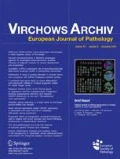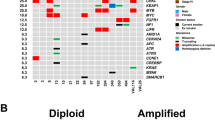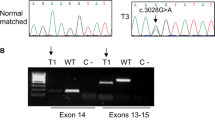Abstract
Alterations in SMARCA4, a member of the chromatin remodeling Switch Sucrose Non-Fermentable (SWI/SNF) complex, characterize a subset of non-small cell lung cancer (NSCLC), but detailed morphological and immunophenotypic description of this tumor type is lacking. We describe 20 NSCLC cases found on routine screening not to express SMARCA4 by immunohistochemistry (IHC). These tumors were stained for CK7, TTF1, SMARCA2, SMARCA4, SMARCB1, and HepPar-1 and analyzed for molecular alterations, using a 160 cancer-related gene panel including the full coding sequence of SMARCA4. Patients were eight females and 12 males aged 41 to 76 (median, 60). Of 18 tumors with detailed data, 14 presented with synchronous distant metastases (M1). Histological examination showed predominantly solid adenocarcinoma (n = 15), frankly rhabdoid (n = 3) and mucinous (n = 2) patterns. Except for the rhabdoid cases, all tumors showed at least focal unequivocal glands and lacked squamous differentiation, justifying a diagnosis of adenocarcinoma. IHC showed a distinctive uniform immunophenotype (CK7+/HepPar-1+/TTF1−) in 18/20 cases. Only 2/16 cases showed limited weak expression of neuroendocrine markers. EGFR mutations and EML4-ALK and ROS1 gene rearrangements were not found in any of the examined cases. Next-generation sequencing, using a 160 cancer-related gene panel, revealed concurrent SMARCA4 and TP53 mutations in nine of the 12 (75%) successfully tested cases. Our study highlights (1) the morphological diversity of SMARCA4-deficient lung adenocarcinoma, (2) the consistent absence of expression of TTF1 in the presence of expression of HepPar-1, (3) absence of EGFR driver mutations, and (4) frequent inactivating SMARCA4 mutations as underlying mechanism of the observed SMARCA4 protein loss. SMARCA4-deficient pulmonary adenocarcinoma is emerging as a distinctive, albeit phenotypically heterogeneous molecular subgroup of TTF1-negative NSCLC. Uniform HepPar-1 expression in this subset of NSCLC may represent a diagnostic pitfall and merits further studies to explore the mechanisms involved.





Similar content being viewed by others
References
Biegel JA, Busse TM, Weissman BE (2014) SWI/SNF chromatin remodeling complexes and cancer. Am J Med Genet C Semin Med Genet 166C:350–366
Masliah-Planchon J, Bièche I, Guinebretière JM, Bourdeaut F, Delattre O (2015) SWI/SNF chromatin remodeling and human malignancies. Annu Rev Pathol 10:145–171
Shain AH, Pollack JR (2013) The spectrum of SWI/SNF mutations, ubiquitous in human cancers. PLoS One 8:e55119
Wang X, Haswell JR, Roberts CW (2014) Molecular pathways: SWI/SNF (BAF) complexes are frequently mutated in cancer—mechanisms and potential therapeutic insights. Clin Cancer Res 20:21–27
Agaimy A (2014) The expanding family of SMARCB1(INI1)-deficient neoplasia: implications of phenotypic, biological, and molecular heterogeneity. Adv Anat Pathol 21:394–410
Jelinic P, Mueller JJ, Olvera N et al (2014) Recurrent SMARCA4 mutations in small cell carcinoma of the ovary. Nat Genet 46:424–426
Ramos P, Karnezis AN, Craig DW et al (2014) Small cell carcinoma of the ovary, hypercalcemic type, displays frequent inactivating germline and somatic mutations in SMARCA4. Nat Genet 46:427–429
Witkowski L, Carrot-Zhang J, Albrecht S et al (2014) Germline and somatic SMARCA4 mutations characterize small cell carcinoma of the ovary, hypercalcemic type. Nat Genet 46:438–443
Reisman DN, Sciarrotta J, Wang W, Funkhouser WK, Weissman BE (2003) Loss of BRG1/BRM in human lung cancer cell lines and primary lung cancers: correlation with poor prognosis. Cancer Res 63:560–566
Medina PP, Carretero J, Fraga MF, Esteller M, Sidransky D, Sanchez-Cespedes M (2004) Genetic and epigenetic screening for gene alterations of the chromatin-remodeling factor, SMARCA4/BRG1, in lung tumors. Genes Chromosomes Cancer 41:170–177
Herpel E, Rieker RJ, Dienemann H et al (2017) SMARCA4 and SMARCA2 deficiency in non-small cell lung cancer: immunohistochemical survey of 316 consecutive specimens. Ann Diagn Pathol 26:47–51
Travis WD, Brambilla E, Burke AP, Marx A, Nicholson AG (eds) (2015) WHO classification of tumours of the lung, pleura, thymus and heart, 4th edn. IARC Press, Lyon
Giedl J, Büttner-Herold M, Wach S, Wullich B, Hartmann A, Agaimy A (2016) Hepatocyte differentiation markers in adenocarcinoma of the prostate: hepatocyte paraffin 1 but not arginase-1 is specifically expressed in a subset of prostatic adenocarcinoma. Hum Pathol 55:101–107
Wilson BG, Helming KC, Wang X et al (2014) Residual complexes containing SMARCA2 (BRM) underlie the oncogenic drive of SMARCA4 (BRG1) mutation. Mol Cell Biol 34:1136–1144
Conlon N, Silva A, Guerra E et al (2016) Loss of SMARCA4 expression is both sensitive and specific for the diagnosis of small cell carcinoma of ovary, hypercalcemic type. Am J Surg Pathol 40:395–403
Hasselblatt M, Gesk S, Oyen F et al (2011) Nonsense mutation and inactivation of SMARCA4 (BRG1) in an atypical teratoid/rhabdoid tumor showing retained SMARCB1 (INI1) expression. Am J Surg Pathol 35:933–935
Le Loarer F, Watson S, Pierron G et al (2015) SMARCA4 inactivation defines a group of undifferentiated thoracic malignancies transcriptionally related to BAF-deficient sarcomas. Nat Genet 47:1200–1205
Agaimy A, Daum O, Märkl B, Lichtmannegger I, Michal M, Hartmann A (2016) SWI/SNF complex-deficient undifferentiated/rhabdoid carcinomas of the gastrointestinal tract. A series of 13 cases highlighting mutually exclusive loss of SMARCA4 and SMARCA2 and frequent co-inactivation of SMARCB1 and SMARCA2. Am J Surg Pathol 40:544–553
Strehl JD, Wachter DL, Fiedler J et al (2015) Pattern of SMARCB1 (INI1) and SMARCA4 (BRG1) in poorly differentiated endometrioid adenocarcinoma of the uterus: analysis of a series with emphasis on a novel SMARCA4-deficient dedifferentiated rhabdoid variant. Ann Diagn Pathol 19:198–202
Karnezis AN, Hoang LN, Coatham M et al (2016) Loss of switch/sucrose non-fermenting complex protein expression is associated with dedifferentiation in endometrial carcinomas. Mod Pathol 29:302–314
Agaimy A, Bertz S, Cheng L et al (2016) Loss of expression of the SWI/SNF complex is a frequent event in undifferentiated/dedifferentiated urothelial carcinoma of the urinary tract. Virchows Arch 469:321–330
Agaimy A, Cheng L, Egevad L et al (2017) Rhabdoid and undifferentiated phenotype in renal cell carcinoma: analysis of 32 cases indicating a distinctive common pathway of dedifferentiation frequently associated with SWI/SNF complex deficiency. Am J Surg Pathol 41(2):253–262
Kohashi K, Yamada Y, Hotokebuchi Y, Yamamoto H, Taguchi T, Iwamoto Y, Oda Y (2015) ERG and SALL4 expressions in SMARCB1/INI1-deficient tumors: a useful tool for distinguishing epithelioid sarcoma from malignant rhabdoid tumor. Hum Pathol 46:225–230
Kohashi K, Nakatsura T, Kinoshita Y et al (2013) Glypican 3 expression in tumors with loss of SMARCB1/INI1 protein expression. Hum Pathol 44:526–533
McCluggage WG, Witkowski L, Clarke BA, Foulkes WD (2017) Clinical, morphological and immunohistochemical evidence that small cell carcinoma of the ovary of hypercalcaemic type (SCCOHT) may be a primitive germ cell neoplasm. Histopathology 70:1147–1154
Araujo LH, Timmers C, Bell EH et al (2015) Genomic characterization of non-small-cell lung cancer in African Americans by targeted massively parallel sequencing. J Clin Oncol 33:1966–1973
Orvis T, Hepperla A, Walter V et al (2014) BRG1/SMARCA4 inactivation promotes non-small cell lung cancer aggressiveness by altering chromatin organization. Cancer Res 74:6486–6498
Karnezis AN, Wang Y, Ramos P et al (2016) Dual loss of the SWI/SNF complex ATPases SMARCA4/BRG1 and SMARCA2/BRM is highly sensitive and specific for small cell carcinoma of the ovary, hypercalcemic type. J Pathol 238:389–400
Kothandapani A, Gopalakrishnan K, Kahali B, Reisman D, Patrick SM (2012) Downregulation of SWI/SNF chromatin remodeling factor subunits modulates cisplatin cytotoxicity. Exp Cell Res 318:1973–1986
Bell EH, Chakraborty AR, Mo X et al (2016) SMARCA4/BRG1 is a novel prognostic biomarker predictive of cisplatin-based chemotherapy outcomes in resected non-small cell lung cancer. Clin Cancer Res 22:2396–2404
Oike T, Ogiwara H, Tominaga Y et al (2013) A synthetic lethality-based strategy to treat cancers harboring a genetic deficiency in the chromatin remodeling factor BRG1. Cancer Res 73:5508–5518
Tagal V, Wei S, Zhang W et al (2017) SMARCA4-inactivating mutations increase sensitivity to Aurora kinase A inhibitor VX-680 in non-small cell lung cancers. Nat Commun 8:14098
Author information
Authors and Affiliations
Corresponding author
Ethics declarations
The authors confirm that the study has been performed in accordance with accepted principles of ethical and professional conduct for biomedical scientific research. The study is covered by ethical vota of the medical faculty of the University of Erlangen for retrospective translational research activities.
Sources of grants or funding to this study
None.
Conflicts of interest
The authors declare that they have no conflicts of interest.
Rights and permissions
About this article
Cite this article
Agaimy, A., Fuchs, F., Moskalev, E.A. et al. SMARCA4-deficient pulmonary adenocarcinoma: clinicopathological, immunohistochemical, and molecular characteristics of a novel aggressive neoplasm with a consistent TTF1neg/CK7pos/HepPar-1pos immunophenotype. Virchows Arch 471, 599–609 (2017). https://doi.org/10.1007/s00428-017-2148-5
Received:
Revised:
Accepted:
Published:
Issue Date:
DOI: https://doi.org/10.1007/s00428-017-2148-5




